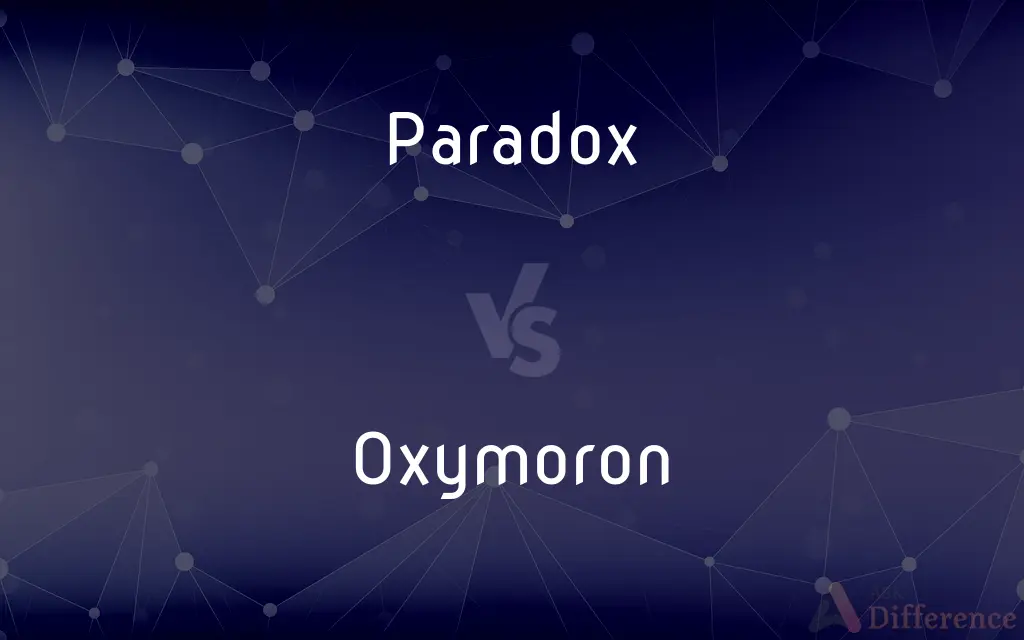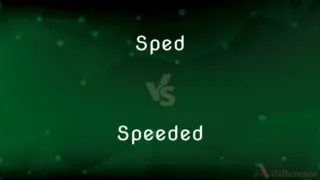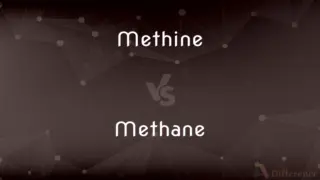Paradox vs. Oxymoron — What's the Difference?
By Tayyaba Rehman — Updated on October 5, 2023
Paradox is a statement that seems self-contradictory but may hold truth, while Oxymoron is a combination of contradictory or incongruent words (e.g., bittersweet). Both utilize contradiction but with varying scopes and formats.

Difference Between Paradox and Oxymoron
Table of Contents
ADVERTISEMENT
Key Differences
Embarking into the realm of language and rhetoric, Paradox and Oxymoron surface as fascinating linguistic phenomena. The Paradox renders itself through statements or propositions that, despite sounding illogical, may contain an embedded truth or resolution.
Divergently, an Oxymoron shines in its compact contradiction, nestling opposing words within a single expression or term, creating a condensed, often ironic, linguistic unit. It creates a seemingly incongruous phrase, such as “deafening silence,” by combining conflicting elements.
Gazing upon the Paradox, the apparent conflict or contradiction invites deeper introspection to unravel concealed truths or wisdom. A Paradox does not resolve within its immediate context and often requires contemplation or a broader perspective for comprehension.
Conversely, the Oxymoron does not envelop an extensive statement or proposition but typically confines itself to a phrase or compound word. Oxymorons inject rich, thought-provoking irony into language by juxtaposing seemingly incompatible words, offering instant paradoxical flair.
In conclusion, while both Paradox and Oxymoron engage with linguistic contradictions, their scale and application diverge prominently. A Paradox may unfold a deeper meaning through its puzzling statement, whereas an Oxymoron delivers a crisp, immediate jolt of contradictory zest.
ADVERTISEMENT
Comparison Chart
Basic Definition
Self-contradictory statement
Combination of contradictory words
Scale
Can be an extended statement
Typically a phrase or compound word
Resolution
May contain a latent truth
Primarily juxtaposes incongruities
Application
Used to convey deep or ironic truths
Used to create ironic expressions
Complexity
Often requires contemplation
Generally understood immediately
Compare with Definitions
Paradox
A seemingly self-contradictory statement that may reveal truth.
Youth is wasted on the young, a well-known Paradox.
Oxymoron
A figure of speech with juxtaposed contradictory terms.
“Bitter sweet” is an Oxymoron that blends opposite emotions.
Paradox
A situation containing conflicting elements which can be true.
The twin Paradox in physics involves relative time.
Oxymoron
A compressed paradox comprising opposing elements.
“Deafening silence” is an Oxymoron that describes intense quiet.
Paradox
A person or thing possessing contradictory features.
He is a Paradox of kindness and cruelty.
Oxymoron
An expressive tool that binds contrary words for effect.
“Original copy” is an Oxymoron illustrating creative contrast.
Paradox
An argument that produces an inconsistency typically within logic.
The liar Paradox challenges the reliability of truth in statements.
Oxymoron
A combination of incongruent words creating irony.
The term “act naturally” is an amusing Oxymoron.
Paradox
An assertion opposing common beliefs but might hold validity.
The Paradox of tolerance questions unlimited tolerance.
Oxymoron
A phrase that combines conflicting descriptors.
“Jumbo shrimp” is an Oxymoron highlighting size discrepancy.
Paradox
A paradox is a logically self-contradictory statement or a statement that runs contrary to one's expectation. It is a statement that, despite apparently valid reasoning from true premises, leads to a seemingly self-contradictory or a logically unacceptable conclusion.
Oxymoron
An oxymoron (usual plural oxymorons, more rarely oxymora) is a figure of speech that juxtaposes concepts with opposing meanings within a word or phrase that creates an ostensible self-contradiction. An oxymoron can be used as a rhetorical device to illustrate a rhetorical point or to reveal a paradox.
Paradox
A seemingly absurd or contradictory statement or proposition which when investigated may prove to be well founded or true
The uncertainty principle leads to all sorts of paradoxes, like the particles being in two places at once
Oxymoron
A rhetorical figure in which incongruous or contradictory terms are combined, as in a deafening silence and a mournful optimist.
Paradox
A statement that seems to contradict itself but may nonetheless be true
The paradox that standing is more tiring than walking.
Oxymoron
(rhetoric) A figure of speech in which two words or phrases with opposing meanings are used together intentionally for effect.
Paradox
A person, thing, or situation that exhibits inexplicable or contradictory aspects
"The silence of midnight, to speak truly, though apparently a paradox, rung in my ears" (Mary Shelley).
Oxymoron
A contradiction in terms.
Paradox
A statement that is self-contradictory or logically untenable, though based on a valid deduction from acceptable premises.
Oxymoron
A figure in which an epithet of a contrary signification is added to a word; e. g., cruel kindness; laborious idleness.
Paradox
An apparently self-contradictory statement, which can only be true if it is false, and vice versa.
"This sentence is false" is a paradox.
Oxymoron
Conjoining contradictory terms (as in `deafening silence')
Paradox
A counterintuitive conclusion or outcome.
It is an interesting paradox that drinking a lot of water can often make you feel thirsty.
Paradox
A claim that two apparently contradictory ideas are true.
Not having a fashion is a fashion; that's a paradox.
Paradox
A thing involving contradictory yet interrelated elements that exist simultaneously and persist over time.
Paradox
A person or thing having contradictory properties.
He is a paradox; you would not expect him in that political party.
Paradox
An unanswerable question or difficult puzzle, particularly one which leads to a deeper truth.
Paradox
(obsolete) A statement which is difficult to believe, or which goes against general belief.
Paradox
(uncountable) The use of counterintuitive or contradictory statements (paradoxes) in speech or writing.
Paradox
A state in which one is logically compelled to contradict oneself.
Paradox
The practice of giving instructions that are opposed to the therapist's actual intent, with the intention that the client will disobey or be unable to obey.
Paradox
A tenet or proposition contrary to received opinion; an assertion or sentiment seemingly contradictory, or opposed to common sense; that which in appearance or terms is absurd, but yet may be true in fact.
A gloss there is to color that paradox, and make it appear in show not to be altogether unreasonable.
This was sometime a paradox, but now the time gives it proof.
Paradox
(logic) a self-contradiction;
`I always lie' is a paradox because if it is true it must be false
Common Curiosities
Can a Paradox be solved?
Sometimes, though it might require broadening perspectives or receiving additional information.
Can an Oxymoron be a phrase?
Yes, it often consists of two opposing or contradictory words.
Is every Paradox false?
No, paradoxes may hold underlying truths despite apparent contradiction.
Does a Paradox always involve complex ideas?
Not always, some paradoxes can be straightforward yet still counter-intuitive.
Is “sweet sorrow” an Oxymoron?
Yes, because it combines two opposing emotions: sweetness and sorrow.
Can any contradictory words form an Oxymoron?
Not all, the words need to create meaningful, often ironic, expressions when combined.
Can a Paradox be used in everyday language?
Yes, paradoxes might appear in common expressions or casual conversations.
Does an Oxymoron always depict irony?
Generally yes, as it juxtaposes conflicting words to create an ironic effect.
Can a Paradox be true and false simultaneously?
Potentially, it might hold contradictory elements that appear both valid and invalid.
Can a statement be both a Paradox and an Oxymoron?
Yes, if it presents a self-contradictory truth and employs juxtaposed contradictory words.
What is the purpose of using an Oxymoron?
It enhances expression, creates irony, and often provides new insights or perspectives.
Are paradoxes commonly used in literature?
Yes, writers often employ paradoxes to provoke thought and present complex ideas.
Is Oxymoron a paradoxical expression?
Yes, it is a compact, immediate form of a paradox, combining incongruent elements.
Are Oxymorons logical?
While seemingly illogical, they make sense within their own composed expression.
Can paradoxes exist in reality, beyond language?
Yes, real-world scenarios can exhibit paradoxical characteristics, prompting deep exploration.
Share Your Discovery

Previous Comparison
Sped vs. Speeded
Next Comparison
Methine vs. MethaneAuthor Spotlight
Written by
Tayyaba RehmanTayyaba Rehman is a distinguished writer, currently serving as a primary contributor to askdifference.com. As a researcher in semantics and etymology, Tayyaba's passion for the complexity of languages and their distinctions has found a perfect home on the platform. Tayyaba delves into the intricacies of language, distinguishing between commonly confused words and phrases, thereby providing clarity for readers worldwide.















































